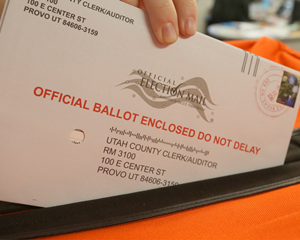He spent months pondering scenarios and talking to experts. It wasn't hard to find liberals who saw Trump as a dangerous dictator, but Podhorzer was careful to steer clear of hysteria. What he wanted to know was not how American democracy was dying but how it might be kept alive. The chief difference between the U.S. and countries that lost their grip on democracy, he concluded, was that America's decentralized election system couldn't be rigged in one fell swoop. That presented an opportunity to shore it up.
他花了几个月的时间考虑各种方案并与专家交谈。在自由派看来,把特朗普视为危险的独裁者并不难,但波德霍泽小心翼翼地避免歇斯底里。他想知道的不是美国民主是如何消亡的,而是如何让它继续存在下去。他总结道,美国与那些失去了对民主的控制的国家之间的主要区别在于,美国分散的选举制度不可能一下子就被操纵。这提供了一个支持它的机会。
On March 3, Podhorzer drafted a three-page confidential memo titled "Threats to the 2020 Election." "Trump has made it clear that this will not be a fair election, and that he will reject anything but his own re-election as 'fake' and rigged," he wrote. "On Nov. 3, should the media report otherwise, he will use the right-wing information system to establish his narrative and incite his supporters to protest." The memo laid out four categories of challenges: attacks on voters, attacks on election administration, attacks on Trump's political opponents and "efforts to reverse the results of the election."
3月3日,Podhorzer起草了一份名为“对2020年选举的威胁”的三页机密备忘录。“特朗普已经明确表示这将不是一场公平的选举,他会拒绝任何东西,除了他自己的连任,认为这是‘假的’和被操纵的,”他写道。“11月3日,如果媒体报道不是这样,他就会利用右翼信息系统来建立自己的叙事,煽动支持者抗议。”备忘录列出了四类挑战:对选民的攻击、对选举管理部门的攻击、对特朗普的政治对手的攻击以及“扭转选举结果的努力”。

Then COVID-19 erupted at the height of the primary-election season. Normal methods of voting were no longer safe for voters or the mostly elderly volunteers who normally staff polling places. But political disagreements, intensified by Trump's crusade against mail voting, prevented some states from making it easier to vote absentee and for jurisdictions to count those votes in a timely manner. Chaos ensued. Ohio shut down in-person voting for its primary, leading to minuscule turnout. A poll-worker shortage in Milwaukee—where Wisconsin's heavily Democratic Black population is concentrated—left just five open polling places, down from 182. In New York, vote counting took more than a month.
随后,2019冠状病毒病(COVID-19)在初选季的高潮爆发。一般的投票方式对选民或通常在投票地点工作的以长者为主的志愿人员已不再安全。但是,由于特朗普反对邮寄投票的运动加剧了政治分歧,一些州无法让缺席投票变得更容易,也无法让司法管辖区及时统计这些选票。混乱接踵而至。俄亥俄州关闭了初选的亲自投票,导致投票率非常低。在威斯康辛州民主党黑人人口集中的密尔瓦基,由于投票站工作人员短缺,只剩下5个开放的投票站,从182个下降到5个。在纽约,计票工作耗时一个多月。
Suddenly, the potential for a November meltdown was obvious. In his apartment in the D.C. suburbs, Podhorzer began working from his laptop at his kitchen table, holding back-to-back Zoom meetings for hours a day with his network of contacts across the progressive universe: the labor movement; the institutional left, like Planned Parenthood and Greenpeace; resistance groups like Indivisible and MoveOn; progressive data geeks and strategists, representatives of donors and foundations, state-level grassroots organizers, racial-justice activists and others.
突然间,11月核反应堆熔毁的可能性显而易见。在他位于华盛顿郊区的公寓里,波德霍泽开始在厨房的桌子上用笔记本电脑工作,每天和他在进步领域的人脉网络连续几个小时开Zoom会议:劳工运动;制度上的左派,如计划生育和绿色和平组织;像“不可分割”和“移动”等抵抗组织;进步的数据极客和战略家,捐赠者和基金会的代表,州级草根组织者,种族正义活动家等。
译文由可可原创,仅供学习交流使用,未经许可请勿转载。












